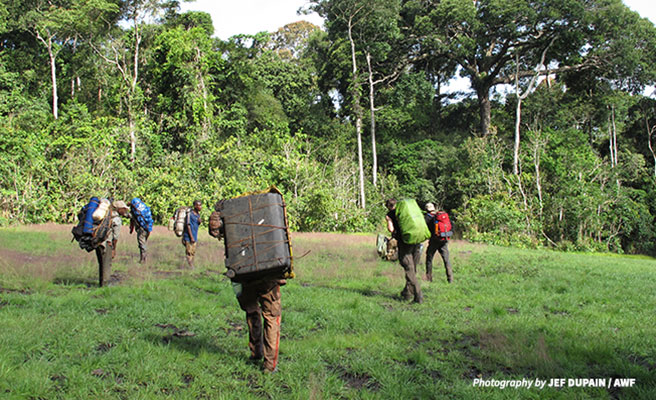Piloting anti-poaching in Africa’s biosphere reserves

Poaching and the unsustainable hunting of wildlife threaten biodiversity and the long-term viability of Africa’s ecosystems. Many species are also hunted for bush meat, affecting the continued survival of those key populations. It is estimated that the national value of the bush meat trade, widely practiced in sub-Saharan Africa, ranges from US $42 million to US $205 million across countries in West and Central Africa. Supported by BfN, the German Federal Agency for Nature Conservation, African Wildlife Foundation is piloting approaches to counter the twin threats of commercial and subsistence poaching in biosphere reserves across Africa with the aptly named Biosphere Reserves as Model Regions for Anti-Poaching in Africa project.
Biosphere reserves as incubators for conservation
Biosphere reserves are great incubators for conservation. They comprise a mosaic of land and resource management units, including core areas that are strictly protected, buffer zones that surround or adjoin the core areas, and transition areas that are more heavily used by people. Their design makes them a special place for testing interdisciplinary approaches and understanding and managing changes and interactions between social and ecological systems, including the current challenges posed by the poaching crisis in Africa.
Measuring wildlife populations and poaching activity
The project started with a survey of the 70 biosphere reserves in sub-Saharan Africa to determine how these biosphere reserves are affected by and coping with, the current poaching issue. The survey collected information on the population status of key wildlife species, extent and causes of commercial and subsistence poaching, anti-poaching strategies, resources available to the biosphere reserve managers for law enforcement, and more. The survey — and project — relates to all vertebrates, including fish, amphibian, reptile, mammal, and bird species. With insights from the survey, AWF will determine the severity of poaching, which will then feed into a process of strengthening practice on the ground in all the reserves.
Research guides anti-poaching strategies
During the project’s field phase, master’s degree students from local universities will be invited to work with the biosphere reserve managers in Bia, Dja, and Lake Chilwa Biosphere Reserves to implement best practices on the ground and bring insights from the experience to a concluding workshop. Ultimately, the program will develop best practices for anti-poaching efforts across biosphere reserves on the continent — and beyond.
The team will meet in Nigeria the week of 11 September to attend the AfriMAB General Assembly where the survey findings will be presented to the wider biosphere community in Africa.
> Download the biosphere reserves project plan to learn more about the implementation